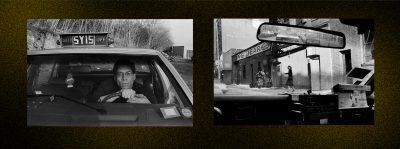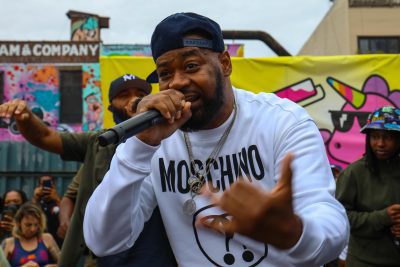Scene from 'Brooklyn 45' (Courtesy of Robert Patrick Stern. A Shudder Release)
Ted Geoghegan discusses his spirited new horror ‘Brooklyn 45’
A film about World War II vets at a séance in Park Slope is imbued with personal and historical touches
The truth will set you free, but it might haunt you first. As unlikely as it may seem, this is important to Ted Geoghegan’s new horror movie.
“Brooklyn 45” follows one terrible yet liberating evening in 1945 for five World War II veterans. What seems like a normal invitation for cocktails at a Park Slope brownstone becomes an impromptu séance where all hell breaks loose.
But invoking the dead is the least of their problems when long-hidden war crimes are revealed. The rest is better left to your viewing pleasure. “Brooklyn 45” is now streaming on Shudder.
Filmmaker Ted Geoghegan’s newest movie received some of his highest praise of his career, reaching the coveted “certified fresh” status on Rotten Tomatoes.
A longtime Manhattanite, Geoghegan sets “Brooklyn 45” in Brooklyn because the borough has long been home to New York’s tried, poor, and completely fascinating immigrants and minorities for over a century.
“Brooklyn has long been the hip borough to live in, even going back to the early 1900s,” says Geoghegan. “It fostered working class people, artists, and welcomed a lot of people that other parts of the city didn’t. It even had a vibrant queer community earlier than other boroughs.”
Yet the filmmaker didn’t shoot the movie in Brooklyn. He faithfully recreated the look of an average Park Slope brownstone — circa 80 years ago — in an old Sears warehouse in Chicago. Geoghegan had no other option because the filmmaking tax structure in New York didn’t allow him to shoot in Brooklyn, a reality for many local independent filmmakers.
Geoghegan tells Brooklyn Magazine about shooting Chicago-for-Park Slope, hiring a familiar face from The Onion in his first starring role, and how his father and grandfather haunt the story of “Brooklyn 45.”
What do you believe happens when we die?
Oh man, that’s a big way to start. I am agnostic. I was raised Catholic and for a while there I was an edgelord atheist. Then I fell into agnosticism, the idea that, I just don’t know. I’m pretty happy with that. I would very much like to believe there’s something else out there, but I have absolutely no reason to believe there’s anything else out there. And who knows, maybe one day something will happen that will change my mind. But for the time being, there most certainly has not been one of those moments.
You shot the movie’s exterior scenes in Chicago to substitute for Park Slope. You live in New York, so why didn’t you shoot in the real Park Slope?
When you make a movie called “Brooklyn 45” and you live in New York City, it is a shame that you don’t get to shoot it in New York City, but the bottom line was just finances. New York City does not make it easy to shoot here and New York State, unfortunately, does not have the tax incentives that it should have to lure people to shoot in the city and in the state.
The Illinois State Film Commission offered incredible incentives to shoot in Illinois. And the bottom line was our budget would go so much further if we were to shoot there. So we said let’s just do it. Also, given the fact that 95 percent of this film takes place inside a room that could be anywhere, that certainly helped make it an easier decision. If we were traveling around Brooklyn a whole lot in the film, I don’t think I would have been able to bring myself to continually fictionalize Brooklyn in Chicago. But for a couple quick shots? I didn’t feel too bad about it.
Why is it important that you based the story in Brooklyn?
I liked the idea of setting a film about these relatively conservative military veterans, with very specific opinions about people’s sexuality, race, religion, and to juxtapose those characters against a background as vibrant and welcoming as Brooklyn.
How did you recreate the Seventh Avenue–Park Slope subway stop as it appeared in 1945?
Sarah Sharp, who was our producer and production designer, her design team when telling me what they were planning on creating for the exterior sequence, said, “We’re thinking about building a subway entrance.” And I thought like, “Oh my God, you guys, that’s ridiculous. Why would you do that?” And they said, “To make it more New York.” So I said, okay, sure. I immediately started digging around online through like the MTA libraries trying to find out what sort of language would have been used on a subway sign during that era. My wife also assisted in that because I was so busy with a hundred other things that I had my wife back home in New York trying to figure out the precise language for that sign. In the film, you can barely even read the text on the screen, but it is there. It adds that little additional bit of authenticity to all of it. It’’s a really beautiful, period accurate subway entrance for what that station in theory would have looked like in 1945.
Ron E. Rains is in the movie, who people might know as The Onion’s “chief film critic” Peter K. Rosenthal.
I knew Ron as Peter K. Rosenthal videos and we had not yet cast the role of Bob when I got to Chicago about a month before we started shooting. We put out a casting call in the Chicago area and Ron sent in a submission and it was so phenomenal. He just landed the character so strongly that it was just like, I watched every other submission but nobody even came close to how good he was. He was just amazing. It’s such an honor to be able to give him his first leading performance, a major performance in a film.
I saw the Twitter thread about your World War II vet grandfather teaching you to love movies. Did he inspire any of “Brooklyn 45”?
My grandfather and namesake, Theodore Roosevelt Geoghegan, did serve in World War II. He was in Germany during the war, and afterwards, he did not speak about it. It was very clear that he had gone through some things and had seen some things during his time in the war. He may have spoken about it to his own children, but he certainly never spoke about it to his grandchildren, my generation. So outside of the respect and admiration I have for him for fighting for my freedoms and fighting against tyranny, he didn’t influence the film as much as my father did.
How did your dad influence the movie?
My father was disabled an Air Force veteran. He was a Staff Sergeant in the U.S. Air Force. He served in the late ’60s, early ’70s and he was in a catastrophic car accident in the early ’70s that left him a quadriplegic. He was honorably discharged from the military after that. That was back during the time when the military actually took care of its veterans. They paid for him to go back to college and he got his masters in 20th century U.S. history. I wrote the script with him based on stories my father told me about the military, as well as his own knowledge of 20th century U.S. history.
So he influenced the story and helped write it. What was the experience like?
It was neat to be able to work on a script with my dad. I had written out about an eight page treatment of the film and I had reached a point where I knew what was going to happen next, but I just couldn’t get there. I couldn’t figure out how to get from point B to point C. So on a whim, I sent those first 25 pages of the script to my dad. I said, “Dad, take a look at this. Let me know what you think.” He read it and he said, “I’m not a creative in the slightest, but I can tell you what you got wrong. You call this guy a Colonel, he should be a Sergeant. You call this guy a Major, he should be a General.” He went through all of the military stuff that I got wrong. One of the things that he corrected me on quite a bit in those first few pages were the battles that these men would have seen. He wanted it to be as accurate as possible to what these soldiers actually would have gone through.
Once he gave me that information, I know it’s kind of a silly thing to say, but all of the characters came to life. They all suddenly had been in battles and had scars from it. I knew who they were and where they were from, and the rest of the script just poured out of me. It was so invaluable to be able to have just that little bit of insight.
Was he involved in the filming?
We bounced the script back and forth about six or seven times before he called me up in January of 2019 and said, “It’s done, man. This is really exciting. I can’t wait to see it.” I said, “Yeah, I can’t wait to watch it.” I hung up the phone and he passed away. It was the last conversation I ever had with him.
Did that change the importance of the story for you?
When that happened, not only was I heartbroken, but I was shocked because this script suddenly became more personal than I ever thought it would. I knew that I had to do it right. I knew I only had one chance to make a movie with my dad and this was it. So I can’t fuck it up.
There’s a reason why I finished that script in early 2019 and here we are halfway through 2023 and the movie’s coming out. It’s because I was going to take my time to make sure that I found the right team to be able to bring it to life. To be able to make something that I would be proud of.
I know you’re agnostic, but do you hope your dad can see the work created together?
I have no reason to believe that my father is up on some cloud somewhere looking down on me being proud of the movie. But I do believe in reality and what I can see right in front of me and what I see right in front of me is a film that I am proud to have been able to dedicate to my father and a film that I’m grateful that I had the opportunity to work on with him. And to me, that’s living forever. So after life aside, that’s the best gift I could ask for.
You might also like 


























